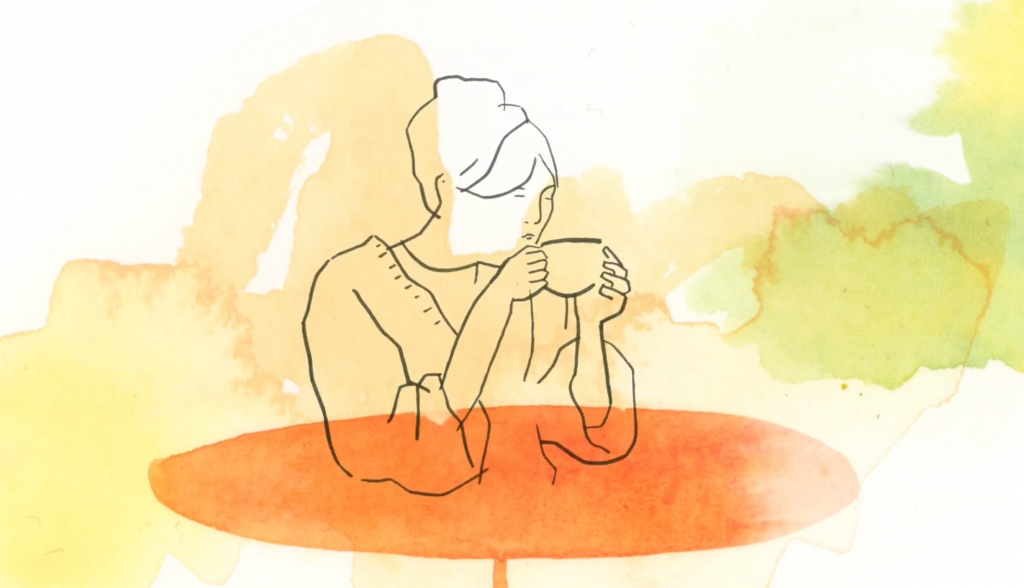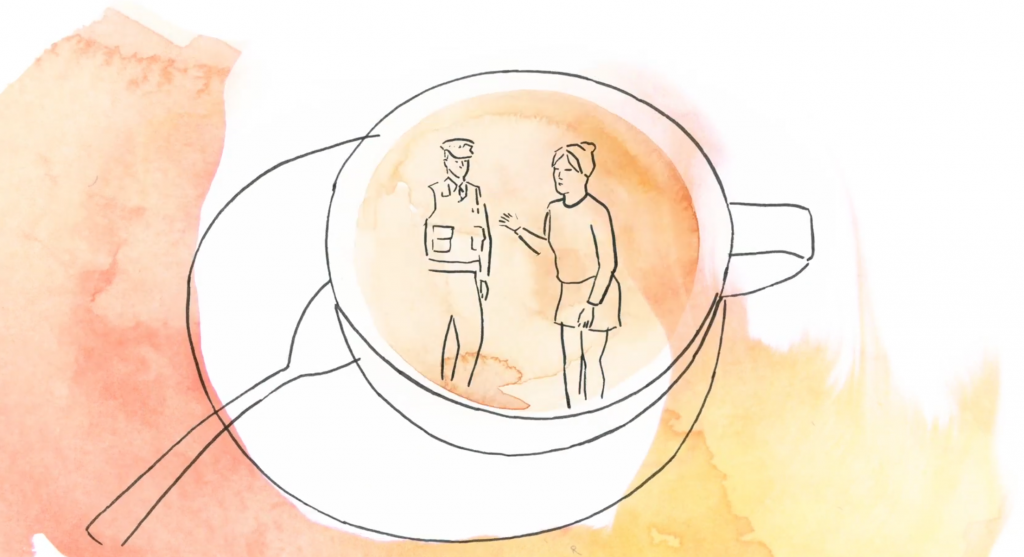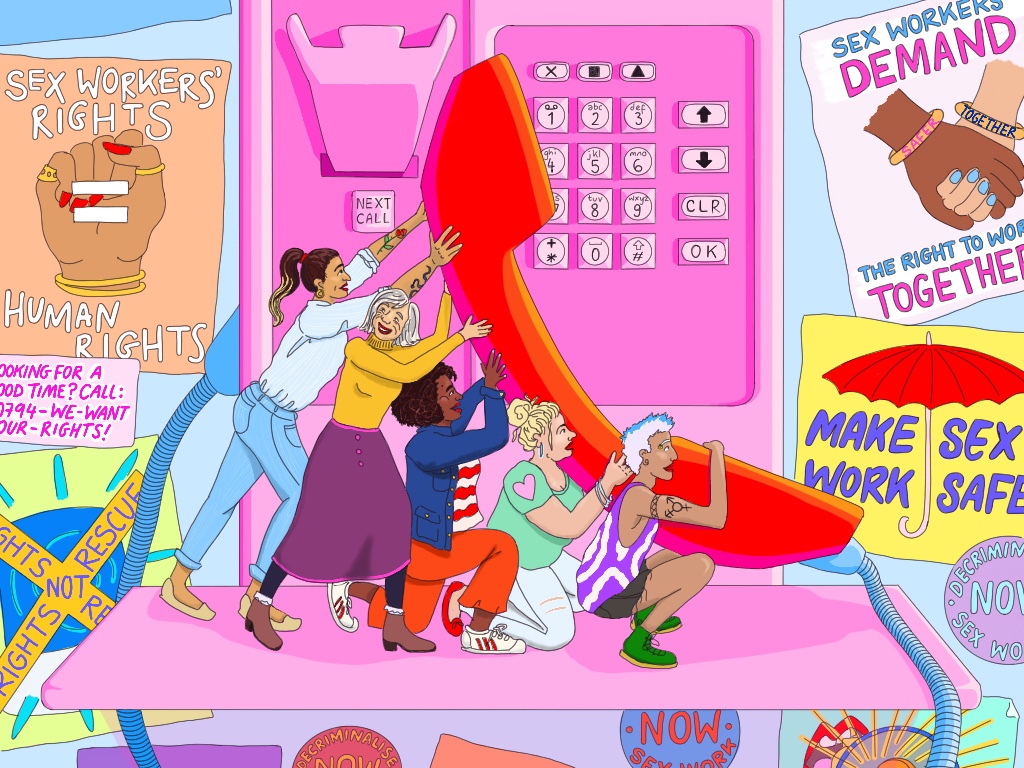I’m two hours into my nine hour shift and it’s a quiet day. We are all feeling anxious because yesterday was quiet too, like every other day this month.
I feel a mounting sense of doom at how I am going to cover my bills. I tell Mary, our receptionist, I’m writing an article about my work and she laughs and says: “Well, looks like you’ll get it finished today the way things are going.”
Working with Mary means I am breaking the law. Even though it’s legal to be a sex worker, it’s illegal to work together. If more than one woman works from a flat it’s classed as a brothel. I am the only sex worker working today. But others work on different days, so our flat still counts as a brothel.

Image Credit: Tom Senior
Both Mary and I could be charged with brothel keeping which carries a maximum sentence of seven years in prison. Mary could also be charged with controlling me because I pay her to be here with me.
Sex Work: The Choice We Have To Make
Sex workers have to make a choice between working together with other women and risking arrest or working on your own and facing more danger. I chose to risk arrest and work with Mary. I wouldn’t work without her.
She answers the phone, gets the client’s number. Rings it back to make sure it’s real. Opens the door. She’s just outside the bedroom at all times. We deal with difficult clients together.
If I was attacked I wouldn’t go to the police because I would be scared they would arrest me and I couldn’t risk my family finding out what I do.

Image Credit: Tom Senior
The prostitution laws are unjust. I went to court, posing as a “student doing research”, to support women caught up in mass raids on 18 brothels in central London’s Soho district in 2013.
More than 250 police officers, some clad in riot-gear and equipped with dog units, swooped in on flats with the purported aim of cracking down on human trafficking. But, as it was later revealed, none of the dozens of sex workers affected were suspected or confirmed to be trafficking victims.
I listened as the women involved told the magistrate they were all working independently and had found out about the job from friends, or by knocking on the door of the flat and asking.
The court heard that they were able to determine which days they would work and that they had the power to turn down clients. Crucially, far from being “controlled” by their live-in maid, they wanted to work with her because she helped protect them from attack.
But the police claimed that standard employment practices – such as being required to work certain days of the week, between certain times, charge a specific amount of money for each service – all add up to us being “controlled”.
My mouth dropped open when the magistrate sided with the police and shut down 16 of the 18 flats.

Image Credit: Tom Senior
These raids, like many others were done in the name of saving victims of trafficking. No victims were found. But I heard stories of women being taken to a so-called “place of safety”.
When they were eventually questioned and insisted that they weren’t trafficked, they were let go and left to make their own way home in the in the middle of the night. Not only did the raids not help sex workers, it actually harmed us. Particularly those of us who are migrants, who are now turned away from flats by bosses nervous about attracting police attention.
So many women I know are struggling … It’s no wonder mums, in particular, are going into sex work.
I was working behind a bar before I got this job. The pub job was £7-an-hour and for what felt like an eternity, I came home with less than £50 per shift. On my first day as a sex worker I came away with more than double this for the same amount of hours. With that higher hourly wage came independence, relief, choice and fewer worries. You can’t argue with that. Do I feel more exploited here or working in a pub? I can’t tell – I feel exploited in both.
So many women I know are struggling because their benefits have been cut or they have been left with nothing because of sanctions and the delay in paying Universal Credit. No wonder mums in particular are going into sex work. It seems the government gets concerned about women doing “survival sex” to feed our children (especially when it hits the headlines) but not when those same kids are going hungry.
Some people say sex work is so bad that it must be abolished. In no other industry would this same logic apply, you wouldn’t ban shipbuilding because it’s dangerous and exploitative you would support the workers’ demands for better pay and working conditions.
The men in my family used to be shipbuilders. The work was harsh but the pay allowed for some self-respect. Now they face the humiliation of a zero hour contract wage where you have to suck up to your boss every day in order to get enough work to survive the next week. Or the humiliation and abuse of being treated like a scrounger when you go for benefits, including because of disabilities caused by the jobs we do.
Some people say sex work is so bad that it must be abolished. In no other industry would this same logic apply, you wouldn’t ban shipbuilding because it’s dangerous and exploitative you would support the workers’ demands for better pay and working conditions.
I am a member of the English Collective of Prostitutes whose campaign #makeallwomensafe is demanding for the implementation of the Home Affairs Committee recommendations – that sex workers on the street and in premises be decriminalised and criminal records be expunged. We have a petition to the Government calling for this and are gathering as many signatures as we can before August.
I’m not ashamed of what I do for a living. We are workers just like any other demanding more money and less work so that we can reclaim for ourselves more of our life. We are on the front line organising against exploitation in the sex industry and for decriminalisation. Please support the campaign and sign our petition at makeallwomensafe.org
Jo’s story was supplied by the English Collective of Prostitutes.
RightsInfo is devoting its coverage to the issue of sex workers rights and safety all this week (30 July). We are publishing a series of stories from a range of experts including sex workers themselves, whose voices will be central – as they should be.
Read more from our campaign here and please spread the message using hashtag #MakeAllWomenSafe.







